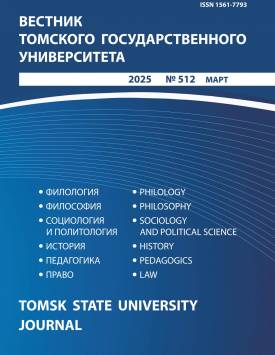Visual word recognition in Adyghe-Russian bilinguals according to the Rey test
Research addressing the imbalance between auditory and written modalities has suggested that consistent language practice involving reading and writing activities enhances lexical access through that specific modality. In individuals with advanced reading skills, word meaning is accessed through the parallel activation of orthographic and phonological lexicons. Conversely, in individuals with poor reading skills, the orthographic lexicon is activated first, followed by the phonological lexicon. The impact of reading skills on lexical access has been previously investigated in heritage bilinguals and second language learners. Several studies showed that second language learners perform tasks in the written modality better than in the auditory modality. This can be explained by the fact that the language practice of these bilinguals involved mainly reading and writing activities. However, heritage bilinguals perform better in auditory modality, presumably because of their greater experience in oral communication. The impact of reading skills on task performance has not been investigated previously in a group of minority language bilinguals. This study focuses on the effects of task modality in Adyghe (West Caucasian)-Russian bilinguals. Participants (N = 69) were asked to memorize words in two languages, Adyghe and Russian, and then recall them orally and recognize them in written form. We hypothesized that the limited use of the Adyghe language in reading and writing might affect word recognition in the written form. First, we collected self-reported background information from bilingual speakers using the Language Experience and Proficiency Questionnaire (LEAP-Q). Then the Rey Auditory Verbal Learning Test (RAVLT) was used to assess verbal working memory in both auditory and written modalities. The questionnaire results showed that the vast majority of respondents prefer to use Adyghe in the auditory modality and Russian in the written modality. The results of the Rey Auditory Verbal Learning Test revealed that bilinguals recognized significantly fewer words (p < 0.001) in the visual modality when presented in the Adyghe language compared to Russian. This effect was related to the language used in texting. The Adyghe-Russian bilinguals who use both languages in texting recognized words in Russian significantly worse (p < 0.001) than those who use mostly or only Russian. The findings from our study correspond with previous studies on the correlation between modality and quality of task performance in bilinguals. The authors declare no conflicts of interests.
Keywords
minority languages, bilingualism, word recognition, verbal working memory, modality effects, lexical accessAuthors
| Name | Organization | |
| Korzhenevskaya Alexandra Yu. | HSE University; Institute of Linguistics of the Russian Academy of Sciences | akorzhenevskaya@iling-ran.ru |
| Gumova Nafiset D. | HSE University; Adyghe State University | ndgumova@hse.ru |
| Khanova Aigul F. | HSE University | aigulkhanova1985@gmail.com |
| Ogly Bela A. | HSE University | bela.170599@gmail.com |
| Bguasheva Aida A. | Adyghe State University | aidabguaseva@gmail.com |
| Protopova Maria A. | HSE University | mprotopova@hse.ru |
| Makerova Susanna R. | Adyghe State University | s.makerova@adygnet.ru |
| Dragoi Olga V. | HSE University; Institute of Linguistics of the Russian Academy of Sciences | odragoy@hse.ru |
References

Visual word recognition in Adyghe-Russian bilinguals according to the Rey test | Vestnik Tomskogo gosudarstvennogo universiteta – Tomsk State University Journal. 2025. № 512. DOI: 10.17223/15617793/512/3
